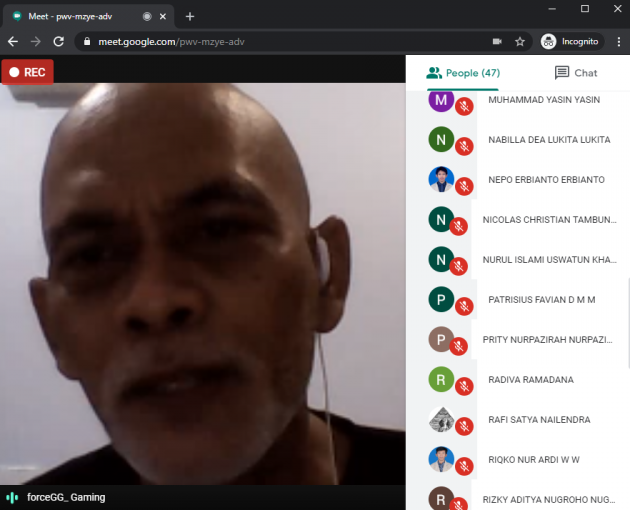
Yogyakarta, April 30th, 2020—The Ministry of Science for Social Development and Welfare Student Families (KAPSTRA) conducted an online discussion entitled “The Community Role Strengthening Social Solidarity Amid Pandemic”. The discussion invited Puthut Yulianto, the chair of the 2016-2020 KAFISIPOLGAMA (Alumni Group of the Faculty of Social and Political Sciences Gadjah Mada University). Puthut is an alumnus of the Government Politics Department class of 1988. Online discussions held through Google Meet, which began at 13.00 WIB.
Puthut started the discussion with the importance of social solidarity. For him, social solidarity or mutual cooperation (gotong royong) has been around for a long time in Indonesia. Mutual cooperation is apparent through how individuals or families respond to neighbours. Social solidarity is important because it is the fulcrum of evidence about community strength and how to deal with problems. “I think this is a learning medium for the community to become a more advanced society,” said Puthut.
The discussion regarding social solidarity itself is increasingly relevant amid a pandemic like this. According to Puthut, the need for social solidarity related to the response of the community in receiving or providing help. “Not only medical concerns, but the need for economic assistance is also felt by the community,” explained Puthut.
Puthut laid out that social solidarity could also start from small things which then enhanced by inviting others to involve. Initiatives to solidarity often arise amid limitations. The limitation concerned is not only material but also space to access. “Solidarity can start from sharing what is there and use it to fill spaces that haven’t been seen by many people,” added Puthut.
One of the solidarity actions carried out by KAFISIPOLGAMA is the Bantu Tetangga/Help Neighbour movement. Fikri, one of the initiators, is a 2014 DPP alumnus. Fikri said that the embryo movement began when he and some friends conducted a fundraiser to provide and distribute hand-sanitizers to micro-businesses around UGM. Not long after, he was invited several times by his friends to fundraise another distribution in the form of food. The target is micro traders who are vulnerable communities around UGM and have experienced a decline in income during the pandemic.
Shortly afterwards, Fikri came up with the idea to help the neighbours. The initial concept was fundraising, then spent at the nearest food stalls. The purpose of this movement can be twofold, turning the wheels of the small businesses’ economy and helping the most vulnerable neighbours around UGM. This movement also involved local leaders to be on targets such as the mosque takmir, the leader of the neighbourhood, and the hamlet. Since its opening on April 12th, 2020, the Bantu Tetangga movement has collected 4.7 million funds.
Fikri continued to explain that the Bantu Tetangga movement also had networked with friends from other communities. One of them is Solidaritas Pangan Jogja or Jogja Food Solidarity, which is then called as one of the biggest and consistent movements in Jogja. In addition, the Bantu Tetangga movement also collaborates with the Start-up community of Jogja to raise funds. Fundraising is done with a charity talk show which is done through the system of donation. Funds collected by this community will be distributed to the Bantu Tetangga movement. According to Fikri, although the forces of this movement are not much, it comes from these networks that this movement keeps ongoing. “Networking with other movements aims to make great hopes for survival amid this pandemic accomplished,” said Fikri.
Not only the movement of Bantu Tetangga, Fikri also mentioned many other communities that also did the same thing in Yogyakarta. For example, the activities that help online transportation drivers, fundraising for personal healthcare protective equipment, and solidarity to help distribute groceries. Moreover, there is also the Solidaritas Pangan Jogja who opens a public kitchen. This movement can produce fifty to a hundred of rice box for vulnerable people on the streets of Yogyakarta. “There are many similar movements in Jogja, with various forms and specific targets,” explained Fikri.
